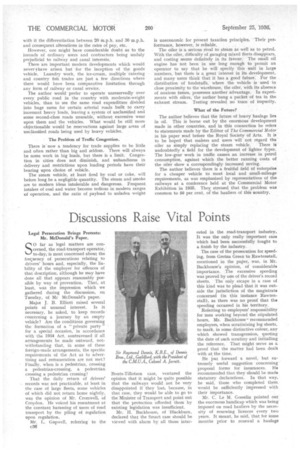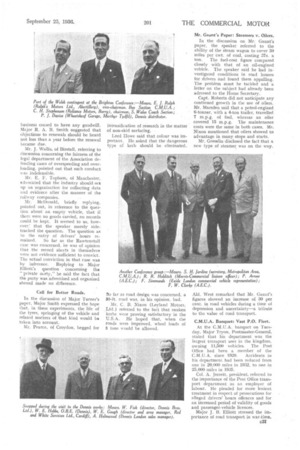Discussions Raise Vital Points
Page 86

Page 87

If you've noticed an error in this article please click here to report it so we can fix it.
Legal Persecution Brings Protests: Mr. McDonald's Paper.
S0 far as legal matters are concerned, the road-transport operator. to-day, is most concerned about the frequency of persecutions relating to drivers' 'hours and, especially, the liability of the employer for offences of that description, although he may have done all that appears reasonably possible by way of prevention. That, at . least, was the impression which we gathered during the discussion, on Tuesday, of Mc McDonald's paper. Major J. B. Elliott raised several points of unusual interest. Is it necessary, he asked, to keep records concerning •a journey by an empty vehicle? Are the conditions governing the formation of a "private party" for a special occasion, in accordance with the 1934 Act, contravened if all arrangements be made outward, notwithstanding that, in some of these foreign-made arrangements, the specific requirements of the Act as to advertising and remuneration are not met? Finally, when is a pedestrian, crossing a pedestrian-crossing, a pedestrian crossing a pedestrian crossing?
That the daily return of drivers' records was not practicable, at least in the case of large fleets, some vehicles of which did not return home nightly, was the opinion of Mr. Cromwell, of Croydon. He voiced his resentment at the constant harassing of users of road transport by the piling of regulation upon regulation.
Mr. L. Gupwell, referring to the c3B.
Bouts-Tillotson case, ventured the opinion that it might be quite possible that the railways would not be very disappointed if they lost, because, in that case, they would be able to go to the Minister of Transport and point out that the protection afforded them by existing legislation was insufficient.
Mr. H. Backhouse, of 'Blackburn, declared that the Smart case should be viewed with alarm by all those inter
ested in the road-transport industry. It was the only really important case which had been successfully fought to a finish by the industry.
The case of the prosecution for speeding, from Gretna Green to Ra.wtenstall, mentioned in the paper, was, in Mr. Backhouse's opinion, of considerable importance. The excessive speeding was proved by one of the driver's record sheets. The only escape in a case of this kind was to plead that it was outside the jurisdiction of the magistrate concerned (in this instance Rawtenstall), as there was no proof that the speeding occurred in his territory.
Referring to employers' responsibility for men working beyond the stipulated hours, Mr. Backhouserecommended employers, when scrutinizing log sheets, to mark, in some distinctive colour, any which showed transgression, quoting the date of such scrutiny and initialling the reference. That might serve as a proof that the matter had been dealt with at the time.
He put forward a novel, but extremely useful suggestion concerning proposal forms for insurances. He recommended that they should be made statutory declarations. In that way, he said, those who completed them would be sufficiently impressed with their importance.
Mr. C. Le M. Gosselin pointed out the enormous handicap which was being. imposed on road hauliers by the necessity of renewing licences every two years. It meant, he said, that for Some months prior to renewal a haulage
business ceased to have any goodwill. Major R. A. B. Smith suggested that objections to renewals should be heard not less than a year before the renewal became due.
Mr. J. Wallis, of Birstall, referring to discussion concerning the fairness of the legal department of the Association defending cases of overspeecling and overloading, pointed out that such conduct was indefensible.
Mr. E. F. Topham, of Manchester, advocated that the industry should .set up an -organization for collecting data and evidence after the manner of the
railway companies. • Mr. McDonald, briefly replying, pointed oat, in reference to the question about an empty vehicle, that if there were no goods carried, no records could be kept. It seemed to us, however; that the speaker merely sidetracked the question. The question as to the entry of drivers' hours re mained. So far as the Rawtenstall case was concerned, he was of opinion that the record sheets in themselves were not evidence sufficient to convict. The actual conviction in that case was by inference. Replying to Major Elliott's question concerning the "private party," he said the fact that the party was advertised and organized abroad made no difference.
Call for Better Roads.
In the discussion of Major Turner's paper, Major Smith expressed the hope that, in these experiments, the life of the tyres, springing of the vehicle and related matters of that kind would be taken into account.
Mr. Pearce, of Croydon, begged for intensification of research in the matter of non-skid surfacing.
Lord Howe said that colour was important. He asked that the dangerous type of kerb should be eliminated.
So far as road design was concerned, a 30-ft. road was, in his opinion, bad.
Mr. C. B. Nixon (Leyland Motors, Ltd.) referred to the fact that sunken kerbs were proving satisfactory in the U.S.A. He hoped that, when the roads were improved, wheel loads of 5 tons would be allowed.
Mr. Gaunt's Paper: Steamers v. Oilers.
In the discussion on Mr. Gaunt's paper, the speaker referred to the ability of the steam wagon to cover 30 miles per cwt. of coal, costing 37s. a ton. The fuel-cost figure compared closely with that of an oil-engined vehicle. The speaker said he had investigated conditions in road houses for drivers and found them appalling. The problem must he tackled and a letter on the subject had already been adressed to the Home Secretary.
Capt. Roberts did not anticipate any continued growth in the use of oilers. Mr. Marsden said that a petrol-engined fi-tonner, with a 4-ton trailer, travelled 7 m.p.g. of fuel, whereas an oiler covered 15 m.p.g. '[lie maintenance costs were the same in both cases. Mr. Nixon mentioned that oilers showed to advantage in many stops and starts.
Mr. Gosselin disclosed the fact that a new type of steamer was on the way.
Aid. West remarked that Mr. Gaunt's figures showed an increase of 30 per cent. in road vehicles during a time of depression and uncertainty—a tribute to the value of road transport.
C.M.U.A. Banquet: Vast P.O. Fleet.
At the C.M.U.A. banquet on Tuesday, Major Tryon, Postmaster-General stated that his department was the largest transport user in the kingdom, owning 11,500 vehicles. The Post Office had been a member of the C.M.U.A. since 1920. Accidents in his department had been reduced from one in 20,000 miles in 1932, to one in 25,000 miles in 1935.
Col. A. Jerrett, president, referred to the importance of the Post Office transport department as an employer of labour. He pleaded for more lenient treatment in respect of prosecutions for alleged drivers' hours offences and for an increased period of Validity of goods and passenger-vehicle licences.
• Major J. B. Elliott stressed the importance of road transport in war-time. c37
























































































































































